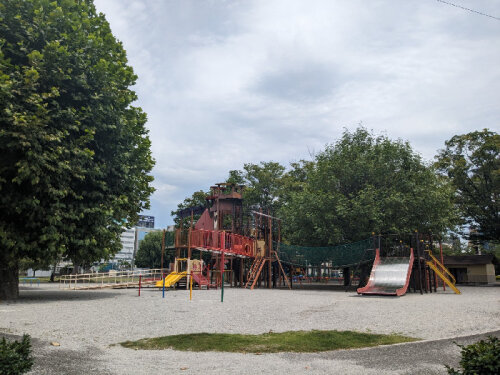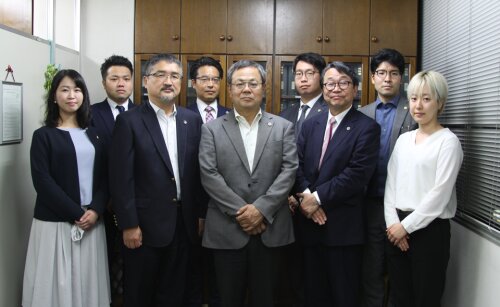Best Brain Injury Lawyers in Shizuoka
Share your needs with us, get contacted by law firms.
Free. Takes 2 min.
List of the best lawyers in Shizuoka, Japan
About Brain Injury Law in Shizuoka, Japan
This guide explains the legal issues people commonly face after a brain injury in Shizuoka Prefecture. Brain injury can result from traffic collisions, workplace accidents, falls, assaults, or medical malpractice. Legal matters often involve claims for compensation, access to government benefits, disability certification, criminal reporting, and long-term care planning. Laws and procedures that apply in Shizuoka are primarily national Japanese laws, applied and administered through local institutions such as courts, hospitals, insurers, health and welfare offices, and the local bar association.
Why You May Need a Lawyer
You may need an attorney if your brain injury involves any of the following - complex liability disputes, disabilities that require long-term care planning, disputes with insurance companies, medical malpractice claims, workplace injury claims, or criminal acts where you seek victim compensation. Lawyers can help by assessing legal options, gathering medical and accident evidence, negotiating fair settlements with insurers or opposing parties, preparing and filing lawsuits when necessary, coordinating medical expert opinions, and helping you access public benefits and disability certifications.
Local Laws Overview
Key legal frameworks that affect brain injury cases in Shizuoka include the following -
- Civil Liability and Tort Law - Under Japan's Civil Code a person who causes wrongful damage to another is liable to compensate. Civil claims cover medical expenses, lost earnings, future care costs, and non-pecuniary damages such as pain and suffering and loss of life quality.
- Motor Vehicle Liability and Insurance Law - Traffic accidents are governed by road traffic rules and mandatory automobile liability insurance. Compulsory insurance covers certain minimum amounts; victims often claim additional compensation from third-party insurers or private policies for remaining losses.
- Workers' Compensation - If the brain injury occurred at work or in the course of employment, the Industrial Accident Compensation Insurance system and Labour Standards Act provide benefits for medical care, disability compensation, and rehabilitation. Employers must report workplace injuries and cooperate with insurance procedures.
- Medical Malpractice - Claims against medical providers are usually pursued under civil tort principles for negligence. Medical records, expert medical testimony, and proof of breach of standard of care are central to malpractice claims.
- Disability and Welfare Law - Disability certification under the Act on Welfare of Persons with Disabilities and related municipal systems can unlock social welfare supports, disability pensions and services. Long-Term Care Insurance is another national system that may provide care services depending on age and diagnosis.
- Criminal Law and Victim Support - If a brain injury came from a criminal act, the police and public prosecutor handle the criminal case. Victims may pursue criminal injuries compensation through the offender, or apply for victim support services available through prefectural or municipal victim support centers.
- Time Limits - There are statutory time limits for civil claims. As a general rule, tort claims should be initiated within a defined period after you learn of the damage and the responsible party, with an outer limit measured from the date of the act. The exact time limits depend on the type of claim and circumstances, so prompt consultation with a lawyer is important.
Frequently Asked Questions
What counts as a compensable brain injury in Shizuoka?
Any brain injury that causes preventable harm from someone else’s fault can give rise to compensation claims. Compensable injuries include traumatic brain injury from a traffic crash, work accident, assault, or brain damage linked to negligent medical treatment. Compensable elements typically include past and future medical expenses, lost wages, reduced earning capacity, long-term care costs, and compensation for pain and suffering.
How do I prove a brain injury for a legal claim?
Proof usually relies on medical records, imaging studies, neuropsychological evaluations, testimony from treating clinicians, witness statements about the accident, police reports if applicable, and documentation of expenses and lost income. Expert medical opinions are often necessary to link the injury to the defendant’s conduct and to estimate long-term care needs.
What should I do immediately after a brain injury?
Seek medical care right away and follow medical advice. Preserve evidence - keep medical reports, receipts, photos of the scene and injuries, witness names, and police reports. If the injury was a traffic accident or crime, report it to the police. Notify your insurer and your employer if it was a workplace injury. Avoid agreeing to settlements without legal advice.
How long do I have to file a claim?
Time limits vary by the type of claim. In general civil tort cases there is a time limit measured from when the victim knew of the damage and the responsible party, and an absolute outer limit measured from the date of the act. Specific periods depend on the precise legal basis and the facts. Insurance companies may also impose procedural timelines. Contact a lawyer promptly to avoid losing rights by delay.
Can I get compensation through my employer or workers' compensation?
If the injury occurred in the course of employment, Industrial Accident Compensation Insurance typically covers medical treatment, disability benefits, and compensation for lost earnings. Employers have reporting duties and the workers' compensation system operates differently from private tort claims - consult a lawyer and the labor standards office to understand which route best protects your rights.
What if my brain injury was caused by medical treatment?
Medical malpractice claims require showing that the medical provider breached the standard of care and that the breach caused the injury. Collect all medical records promptly and ask for a second medical opinion and expert evaluation. Malpractice cases can be medically complex and often involve detailed expert testimony and negotiation with hospital or doctor insurers.
Will insurance cover future care and rehabilitation?
Insurance may cover past and some projected future medical and care costs depending on the policy, the type of claim, and negotiation results. In traffic accidents, compulsory insurance has limits and additional coverage may be sought from the at-fault party’s voluntary insurance or your own policy. In workplace cases, workers' compensation and related benefits can cover rehabilitation and long-term care needs.
Can a brain injury qualify me for a disability certificate or welfare benefits in Shizuoka?
Yes. If the injury causes lasting physical or cognitive impairment, you may qualify for disability certification under the national system and for various welfare supports administered by municipal or prefectural authorities. A medical diagnosis, functional assessments, and application through your local municipal office are required. Disability status can open access to pensions, care services, and other supports.
How do I find a lawyer who handles brain injury cases in Shizuoka?
Look for lawyers who specialize in personal injury, medical malpractice, or workers' compensation and who have experience with brain injury cases. You can request referrals from the Shizuoka Bar Association or the national legal aid center. Ask prospective lawyers about their experience with brain injury claims, familiarity with medical experts, fee structure, and likely timelines and outcomes.
What if I am not a Japanese speaker or a foreign resident?
Language and residency do not bar you from pursuing claims, but they can add complexity. Seek a lawyer who can provide services in your language or who can work with certified interpreters. Keep records of immigration or insurance status that may affect benefit eligibility. Local government offices and some hospitals can provide foreign language assistance in many prefectures, but check availability in advance.
Additional Resources
Consider contacting the following organizations and institutions for help and information -
- Shizuoka Bar Association - for lawyer referrals and information on legal consultation services in the prefecture.
- Japan Legal Support Center - a national legal aid organization that provides consultation and may help with lawyer referrals and financial aid for legal fees.
- Shizuoka Prefectural Government - Health and Welfare Department and the municipal welfare offices - for information on disability certification, welfare services, and long-term care insurance procedures.
- Local police stations and the Shizuoka Prefectural Police traffic divisions - for reporting accidents and obtaining official accident reports.
- Industrial Accident Consultation Offices and Labour Standards Inspection Offices - for workplace injury reporting and workers' compensation questions.
- Major hospitals with neurology, neurosurgery and rehabilitation services in Shizuoka - for diagnosis, treatment and medico-legal documentation. Ask your treating doctor about medico-legal reports and specialists able to provide expert opinions.
- National agencies such as the Ministry of Health, Labour and Welfare - for national policies on disability support, welfare, and medical practice standards.
- Victim Support Centers or municipal victim services - for assistance if your injury resulted from a crime, including counseling and practical support.
- NPOs and patient support groups concerned with brain injury and neurorehabilitation - for peer support, rehabilitation resources and practical advice from others who have experience with similar injuries.
Next Steps
If you or a loved one has suffered a brain injury in Shizuoka consider the following practical steps -
1. Prioritize medical care - ensure a full medical assessment, follow-up, and obtain copies of all records, imaging and therapy notes.
2. Preserve evidence - keep accident photos, witness names, police reports, employer reports, medication records, bills and proof of lost income.
3. Report as required - notify the police for traffic accidents or criminal acts, and your employer for workplace injuries. File insurance claims promptly but avoid signing final releases without legal advice.
4. Seek legal consultation - contact a lawyer experienced in brain injury and personal injury law. Ask about initial consultation availability, fee arrangements, and client references.
5. Obtain specialist assessments - discuss with your lawyer whether independent medical examinations or specialist neuropsychological assessments are needed to document long-term needs and establish causation.
6. Explore benefits - apply promptly for disability certification, welfare supports and any insurance or workers' compensation benefits you may be entitled to.
7. Decide on claims strategy - with your lawyer weigh the options of negotiating with insurers or pursuing court action. Litigation timelines, costs and likely outcomes should guide your choice.
8. Plan for long-term needs - coordinate legal, medical and social services to secure rehabilitation, assistive services and financial planning for ongoing care.
Final note - This guide provides general information and is not a substitute for professional legal advice. Laws and procedures can change and outcomes depend on your specific facts. Contact a qualified lawyer in Shizuoka for advice tailored to your situation.
Lawzana helps you find the best lawyers and law firms in Shizuoka through a curated and pre-screened list of qualified legal professionals. Our platform offers rankings and detailed profiles of attorneys and law firms, allowing you to compare based on practice areas, including Brain Injury, experience, and client feedback.
Each profile includes a description of the firm's areas of practice, client reviews, team members and partners, year of establishment, spoken languages, office locations, contact information, social media presence, and any published articles or resources. Most firms on our platform speak English and are experienced in both local and international legal matters.
Get a quote from top-rated law firms in Shizuoka, Japan — quickly, securely, and without unnecessary hassle.
Disclaimer:
The information provided on this page is for general informational purposes only and does not constitute legal advice. While we strive to ensure the accuracy and relevance of the content, legal information may change over time, and interpretations of the law can vary. You should always consult with a qualified legal professional for advice specific to your situation.
We disclaim all liability for actions taken or not taken based on the content of this page. If you believe any information is incorrect or outdated, please contact us, and we will review and update it where appropriate.











